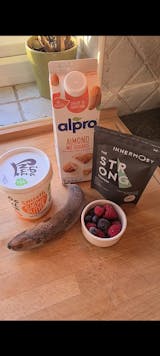Let's talk about gut health tests – you know, those trendy kits that promise to analyze the bacteria in your gut and give you ALL the answers. Seems like everywhere you turn these days, someone's pushing them on you, asking you to mail off your poo for a pricey test.
I teamed up with one of Innermost's resident nutritionists, Sophie Gastman, to dig into the truth behind these tests
First things first, what are gut health tests?
Essentially, they’re marketed as a way to assess the balance of bacteria in your gut. All you have to do is collect a stool sample, ship it off, and wait for your results to roll in.
Companies who offer these tests will most likely offer to sell you a ‘'personalised’' probiotic or prebiotic based on your results, along with some ‘'personalised'’ (but what definitely looks like generic) dietary and lifestyle recommendations.
It all sounds simple enough, but here's where things get murky. Sophie has been looking into the validity of these tests, and she’s a bit skeptical.
"HERE'S WHY"
Accuracy: These tests only give you a snapshot of your gut microbiome at one point in time. Your gut bacteria can change in as little as 24 hours based on what you eat and how you live, so by the time you get your results, they might already be outdated. Plus, different methods to study the same samples can also give wildly different results. So, if you sent your sample off to two different companies, one might say you have a lot of one type of bacteria, while the other says it’s barely there.
Lack of Evidence: Despite years of research, we're still in the dark about which gut microbes are linked to specific health outcomes. So, any test claiming to have all the answers is just too good to be true. For example, scientific studies suggest that knowing what’s in your gut might not actually help with understanding or treating diseases like IBS.
Lack of Actionable Insights: Even if these tests could accurately assess your gut, the recommendations they provide are often based on shaky science. Plus, they're so complex that even the experts struggle to make sense of them.
Lack of Knowledge: Let's face it, most of us aren't microbiologists. So when these tests dump a ton of complicated info in our laps, it's more likely to leave us scratching our heads than feeling empowered.
To make matters worse, these tests can cost a lot of money. We think rather than blowing your hard-earned cash on a gut health test, why not focus on some tried-and-true strategies to support your gut?
Cue Sophie with her top six tips to better gut health
Diet: Fill your plate with a rainbow of fruits, veggies, whole grains, and legumes to keep your gut happy. Aim for 30 plant points a week (a point for every new plant you eat) - this number seems to be the sweet spot for making the most difference to your gut health.
Chill: Stress can wreak havoc on your gut, so find ways to unwind, whether it's through meditation, exercise, or just shooting the breeze with a friend.
Hydrate: Keep the water flowing to keep things moving smoothly in your digestive system.
Sleep: A good night's sleep does wonders for your gut, so aim for 7-9 hours of shut-eye each night.
Ferment: Add some fermented foods like yogurt, kimchi, and sauerkraut to your diet for a boost of gut-friendly probiotics.
Supplement: Innermost's The Digest Capsules contain prebiotics and probiotics to keep your gut bacteria thriving, along with digestive enzymes and ginger. Combine them with all the points mentioned above to help your gut bacteria thrive.
So there you have it – supporting your gut health doesn't have to be complicated or break the bank. Just focus on the basics and make some small lifestyle tweaks, and you’ll be well on your way to a healthier gut for a fraction of the price, and without the need to mail your poo off to some complete stranger.
























